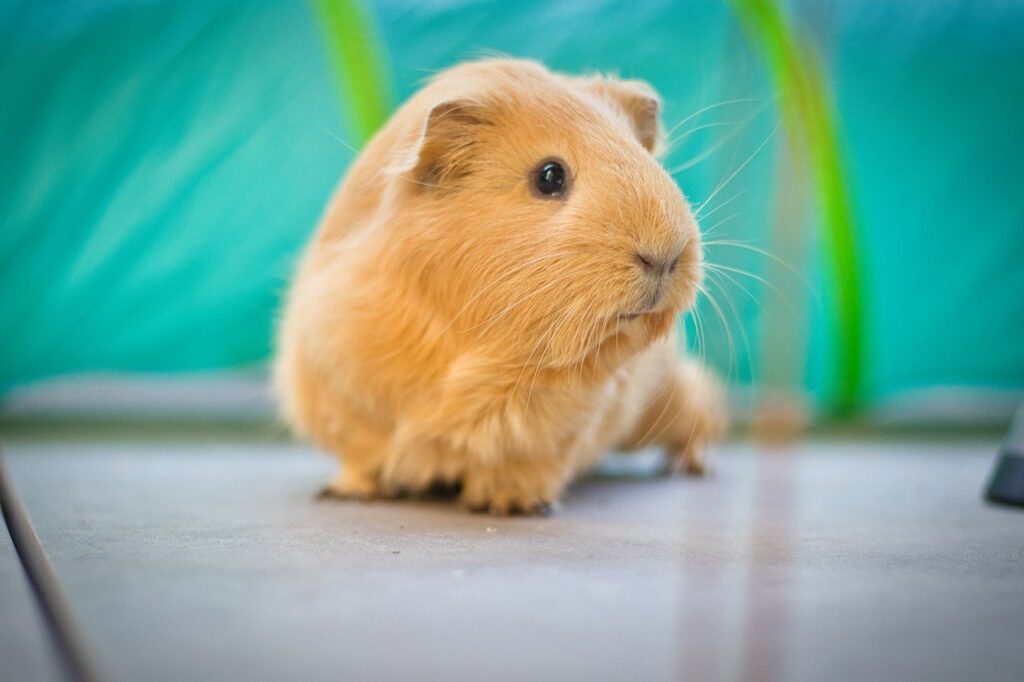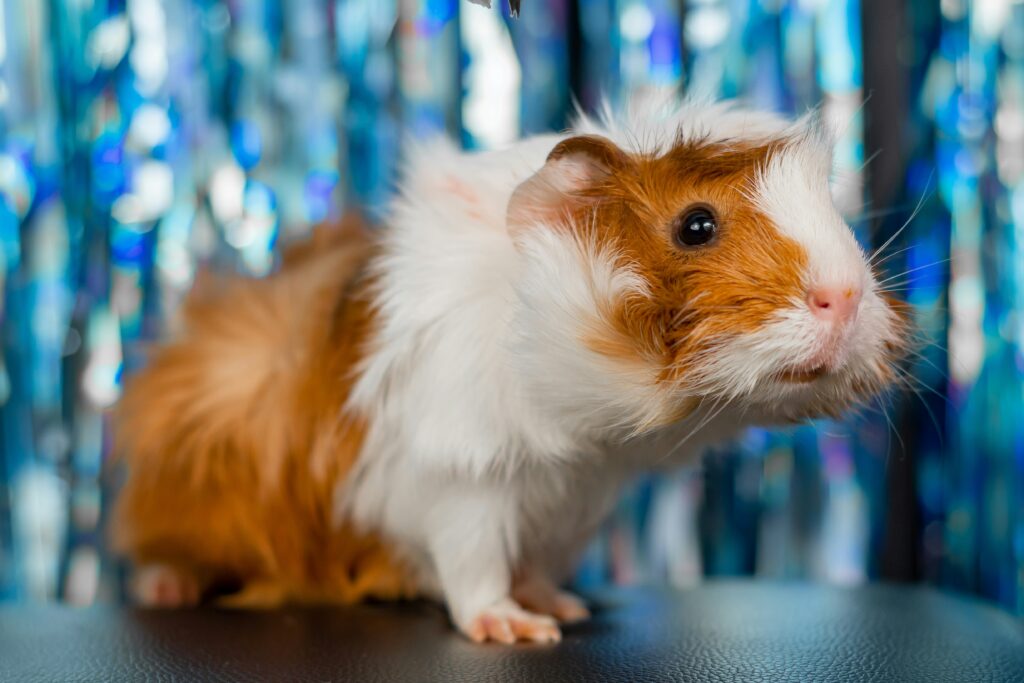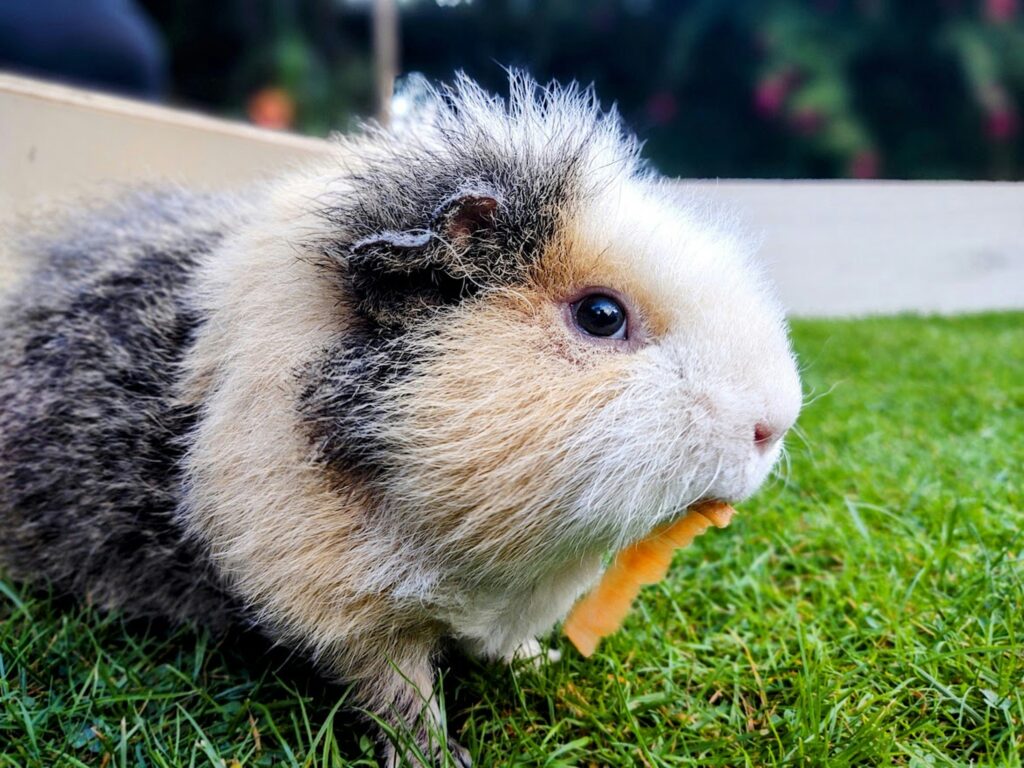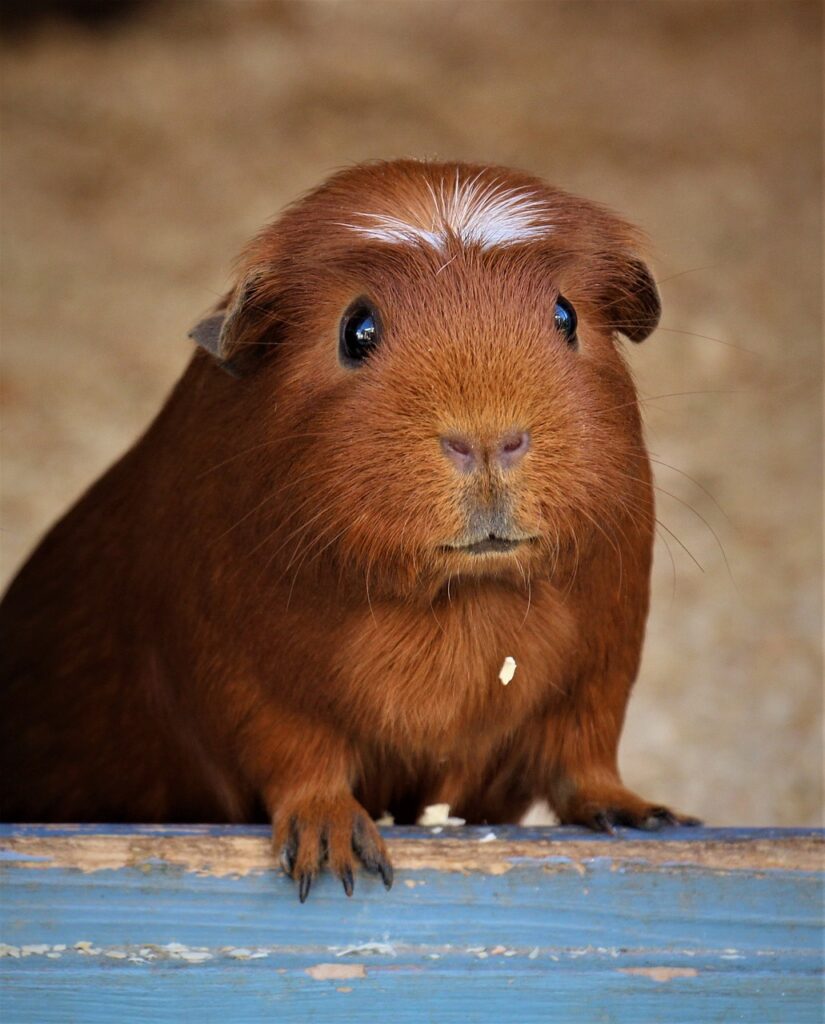
Skinny Pig Guinea Pig
Facts at a glance!
Weight: 1.5 to 2.5lbs.
Coat Type: Mostly hairless with varying amounts of fuzz over the body. They often have a tuft of hair on the nose.
Colors: Any skin tone and pattern!
Lifespan: 5 to 7 years
Introduction
Skinny Pigs are truly unique pets! Unlike their furry counterparts, Skinny Pigs are mostly hairless, giving them a unique look that sets them apart.
In this breed spotlight, we’ll delve into the fascinating history, personality traits, physical characteristics, and essential care tips for Skinny Pigs. Whether you’re a seasoned guinea pig owner or considering adopting one for the first time, this guide will provide valuable insights into the world of Skinny Pigs.
History and Origin
Skinny Pig guinea pigs are relatively new to the pet world, with their origins tracing back to the late 1970s. The breed was first developed through a genetic mutation that occurred in a laboratory setting. Researchers at the Institute Armand Frappier in Montreal, Canada, were studying a colony of guinea pigs when they discovered a hairless gene mutation. This mutation piqued their interest, leading to the intentional breeding of these hairless guinea pigs to study their genetics and potential medical applications.
The resulting breed, known as the Skinny Pig, quickly gained attention for its unique appearance and endearing personality. Over time, breeders began to selectively breed Skinny Pigs to enhance their genetic traits, resulting in the robust and healthy pets we see today. Despite their laboratory origins, Skinny Pigs have found a special place in the hearts of pet owners worldwide.
The genetic mutation responsible for their hairlessness was identified as recessive, meaning that both parents must carry the gene for the offspring to be hairless. This genetic discovery was significant not only for understanding guinea pig genetics but also for broader applications in genetic research. The Skinny Pig’s development involved crossbreeding with other guinea pig breeds to ensure a healthy genetic pool and to introduce various color patterns and skin types.
Personality
One of the most appealing aspects of Skinny Pig guinea pigs is their personality. These small pets are known for their friendly and sociable nature. Skinny Pigs are incredibly affectionate and enjoy human interaction, making them excellent pets for families and individuals alike. They thrive on attention and love being handled, often forming strong bonds with their owners.
Skinny Pigs are also known for their playful and curious demeanor. They are active and enjoy exploring their surroundings, so providing them with a stimulating environment is essential. Toys, tunnels, and plenty of space to roam will keep your Skinny Pig entertained and happy. Additionally, their social nature means they do well with other guinea pigs, so consider adopting them in pairs or small groups to prevent loneliness.
Skinny Pigs are also quite vocal, often communicating with a range of sounds from gentle purrs to excited squeaks. Their vocalizations are a sign of their contentment and engagement, making interactions with them even more rewarding. Skinny Pigs are particularly responsive to their owner’s voice and touch, often seeking out attention and interaction.
Physical Characteristics
The most striking feature of Skinny Pig guinea pigs is their lack of fur. While they are not entirely hairless, they have only a sparse covering of hair on their noses, feet, and legs. Their skin is often wrinkled and can come in various colors and patterns, much like their furry counterparts. The hairless appearance of Skinny Pigs makes them a unique and visually appealing pet.
Despite their lack of fur, Skinny Pigs have all the other physical characteristics typical of guinea pigs. They have a compact, rounded body, short legs, and large, expressive eyes. Their ears are slightly larger and more pronounced due to the lack of fur, adding to their distinctive look. On average, Skinny Pigs weigh between 1.5 to 2.5 pounds and measure about 8 to 12 inches in length.
Their skin can vary in texture, from smooth to slightly rough, and is often sensitive, requiring gentle handling. The absence of fur also makes their skin more prone to scratches and environmental factors, necessitating careful monitoring and appropriate living conditions. The unique appearance of Skinny Pigs, with their wrinkled skin and visible musculature, often leads to comparisons with tiny hippos or baby elephants, adding to their charm.
Care and Maintenance
Don’t forget to locate a good exotic vet with experience treating guinea pigs!
Caring for Skinny Pigs requires some specific considerations due to their hairlessness. Here are some essential care tips to ensure your Skinny Pig remains healthy and happy:
Housing: Provide a spacious and secure cage with plenty of ventilation. Ensure the cage has a solid bottom to protect their delicate toes from injuries. Use soft bedding material, such as fleece or paper-based bedding, to keep them comfortable. Avoid wood shavings or other rough bedding materials that could irritate their skin.
Temperature Regulation: Without fur to keep them warm, Skinny Pigs are more sensitive to temperature changes. Maintain a consistent room temperature between 65-75°F (18-24°C) to keep them comfortable. Avoid placing their cage in direct sunlight or drafty areas. In colder climates, you may need to provide additional warmth through safe heating pads or blankets designed for small animals.
Skin Care: Monitor their skin regularly for dryness or irritation. You may need to apply a gentle, pet-safe moisturizer to keep their skin hydrated. Bathing should be done sparingly, using a mild shampoo specifically formulated for small animals. Over-bathing can strip their skin of natural oils, so it’s best to limit baths to when they are particularly dirty or have skin issues.
Diet: A balanced diet is crucial for their overall health. Provide a diet rich in hay, fresh vegetables, and high-quality guinea pig pellets. Ensure they have access to fresh, clean water at all times. Vitamin C is essential for guinea pigs, so include vitamin C-rich foods like bell peppers and leafy greens in their diet. Supplements may also be necessary if their diet lacks sufficient vitamin C.
Exercise and Enrichment: Skinny Pigs are active and playful, so provide plenty of toys, tunnels, and space to explore. Regular out-of-cage playtime is beneficial for their physical and mental well-being. Creating an enriching environment with varied textures, hideouts, and interactive toys will help keep them stimulated and prevent boredom.
Social Interaction: Skinny Pigs thrive on social interaction. Spend time handling and interacting with them daily. Consider adopting more than one guinea pig to keep them company. Their social nature means they benefit greatly from the companionship of other guinea pigs, helping to prevent loneliness and promoting a happier, more active lifestyle.
Why Choose a Skinny Pig?
There are several reasons why Skinny Pigs make wonderful pets:
Unique Appearance: Their hairless appearance makes them stand out and adds an interesting element to any pet household. Their distinctive look often sparks curiosity and attention from visitors and pet enthusiasts.
Affectionate Nature: Skinny Pigs are known for their loving and sociable personalities. They enjoy human interaction and form strong bonds with their owners. Their desire for attention and their responsive nature make them particularly rewarding pets.
Low Maintenance Grooming: Without fur, Skinny Pigs do not require regular brushing or grooming, making them a low-maintenance pet option. This can be especially appealing to pet owners who prefer less grooming while still providing excellent care.
Playful and Active: Their curious and playful nature ensures they bring joy and entertainment to their owners. Skinny Pig’s active behavior and their love for exploration make them delightful companions.
Great for Allergies: For individuals with allergies to pet fur, Skinny Pigs can be a suitable alternative as they produce less dander. Their hairless nature reduces the allergens typically associated with pet fur, making them a better option for allergy sufferers.
Conclusion
Skinny Pigs truly stand out in the world of guinea pigs. With their distinctive hairless appearance, friendly personalities, and relatively low grooming needs, they make wonderful companions for a variety of pet owners. Proper care and attention to their specific needs will ensure that your Skinny Pig thrives and brings joy to your home for many years. If you’re considering a Skinny Pig, you’ll find a sweet and affectionate friend in this fascinating breed.
Looking for similar breeds?
Check these out!
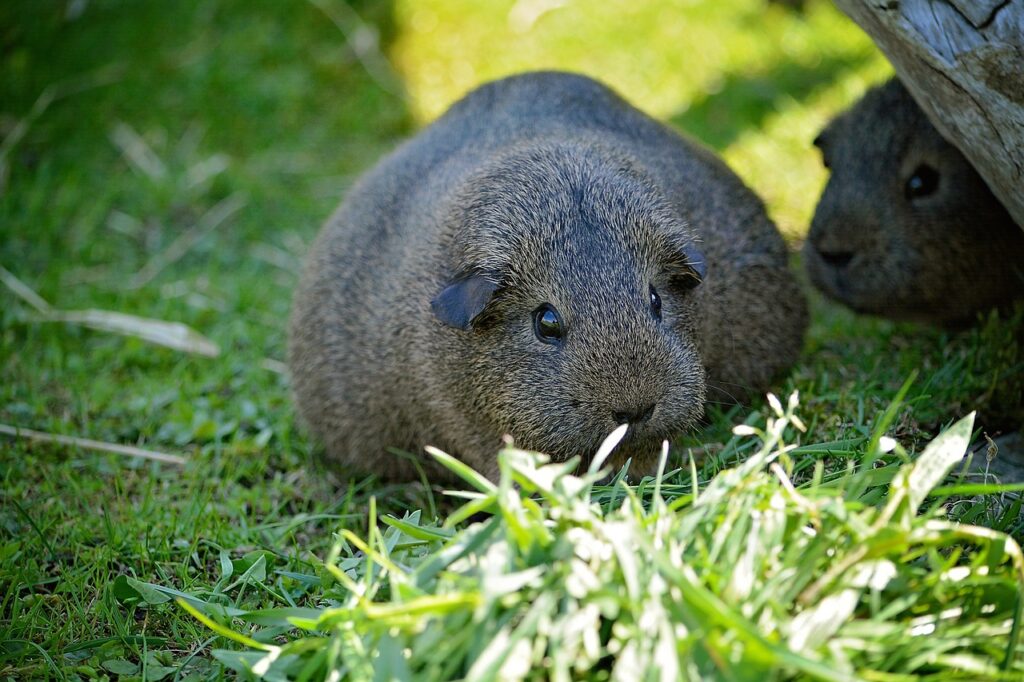
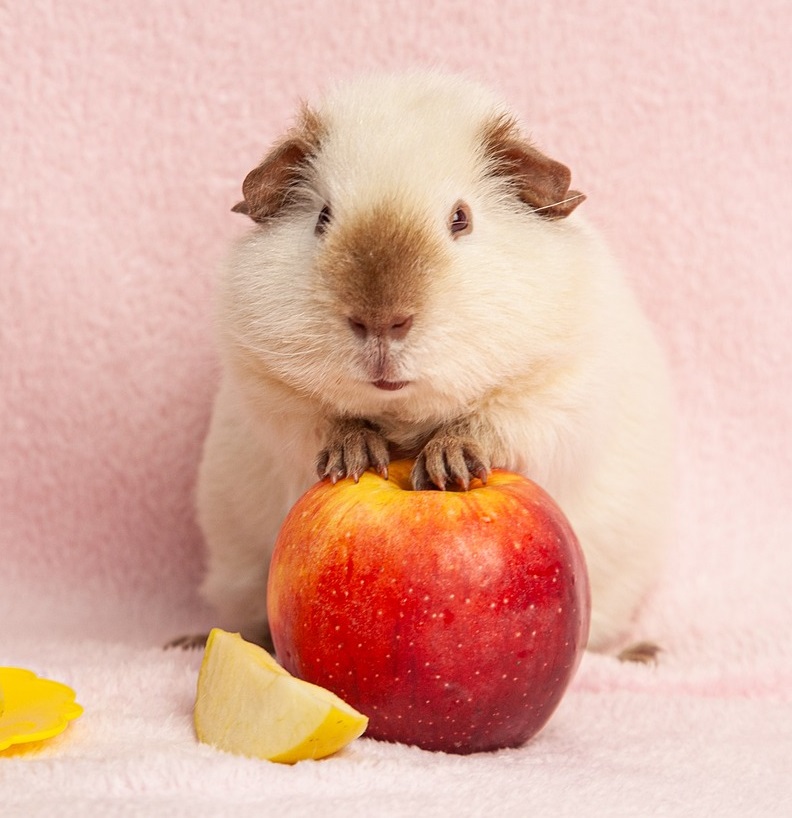
See a Picture Missing?
Here at Hutch Happiness we want to showcase YOUR guinea pigs! If you have a photo of a guinea pig you would like to share, reach out to me at Emily@hutchhappiness.com. Along with your guinea pig photo we are happy to provide a link to your caviary website if available.

